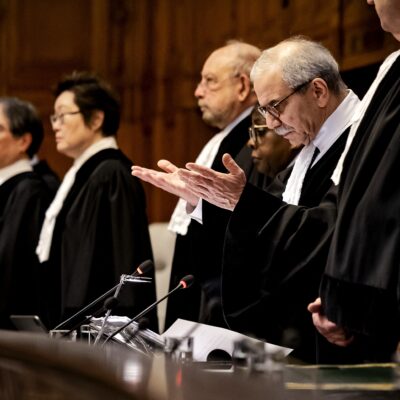Dan Shapiro rejoins Biden admin to focus on boosting the Abraham Accords
The appointment comes amid a congressional effort to create an ambassador-level position focused on normalization between Israel and Saudi Arabia

Michael Brochstein/SOPA Images/LightRocket via Getty Images
Dan Shapiro, former ambassador of the United States to Israel, at the American Zionist Movement/AZM Washington Forum: Renewing the Bipartisan Commitment Standing with Israel and Zionism in the Capitol Visitor Center in Washington, D.C.
Amid a concerted U.S. push to normalize ties between Israel and Saudi Arabia, the State Department announced on Thursday that former U.S. Ambassador to Israel Dan Shapiro would be appointed the department’s senior advisor for regional integration, a newly created position.
Shapiro “will support U.S. efforts to advance a more peaceful and interconnected region, deepen and broaden the Abraham Accords and build the Negev Forum,” Secretary of State Tony Blinken wrote in a tweet.
The appointment comes as the Senate considers whether to approve a bill — which was already passed by the House — that would create an ambassador-level special envoy position focused on the Abraham Accords, the 2020 agreements that normalized ties between Israel, the United Arab Emirates and Bahrain.
“We think it’s an excellent decision and are supportive of the administration’s appointment,” said Jacob Long, a spokesperson for Rep. Ritchie Torres (D-NY), one of the sponsors of the Abraham Accords ambassador legislation. “It doesn’t change our push to have the position of a special envoy for the [Abraham Accords] codified into law because administrations will change and not every [administration] may see it as a priority, so it needs to be made permanent through legislative process.”
But in a Thursday press briefing, State Department spokesperson Matthew Miller suggested that an ambassador-level position is not needed to advance the Abraham Accords.
“The Senate-confirmed piece is — I don’t think is necessary,” Miller said. “There are a number of Senate-confirmed officials already working on this.”
He pointed to Blinken, who raised the issue in a recent trip to Saudi Arabia and discussed it at a Wednesday event at the Council on Foreign Relations, and U.S. Assistant Secretary of State for Near Eastern Affairs Barbara Leaf, to whom Shapiro will report.
“We think he can perform all the duties he needs to perform to advance the agenda as the senior advisor,” said Miller.
Rep. Mike Lawler (R-NY), the other lead sponsor of the legislation, agreed with Torres that Shapiro’s appointment as senior advisor does not diminish the need for a special envoy focused on normalization.
“While the appointment of former Ambassador Daniel Shapiro to the position of Senior Advisor for Regional Integration is welcome news, it does not take away from the fact that we must get the Special Envoy for the Abraham Accords Act signed into law, to ensure that all administrations share the same goal for Israel and the Middle East — lasting peace,” Lawler said in a statement to JI.
House Democrats had floated Shapiro as a strong choice to be nominated for the envoy role if and when the legislation is approved. He previously served as an advisor to the State Department’s Iran envoy, Rob Malley, in 2021 and 2022.
Shapiro comes to the State Department after serving as director of the N7 Initiative, an Atlantic Council program sponsored by the Jeffrey M. Talpins Foundation that seeks to further normalization in the Middle East. (Ed Husain, a Georgetown professor and former advisor to former British Prime Minister Tony Blair, will be replacing Shapiro at N7.) Shapiro declined to comment on his new position.
“Bringing in new countries to normalize” will be one part of Shapiro’s job, said William Wechsler, the N7 Initiative’s senior director. But he will also have to “demonstrate the benefits of normalization to the average person in the region in countries that have already normalized: the economic benefits, the social benefits, the cultural benefits, the people-to-people, the business-to-business [ties].”
Early in President Joe Biden’s term, right-leaning foreign policy critics of the Biden administration questioned whether he would maintain the Trump administration’s commitment to the Abraham Accords.
“Thankfully, we’re passed that initial trend that we saw,” Wechsler said. “What we see from this decision is that the administration is fully not just supportive, but directive, by trying to drive a new regional integration.”
JI Capitol Hill reporter Marc Rod contributed reporting.
This story was updated to include the comments of State Department spokesman Matthew Miller and Rep. Mike Lawler (R-NY).










